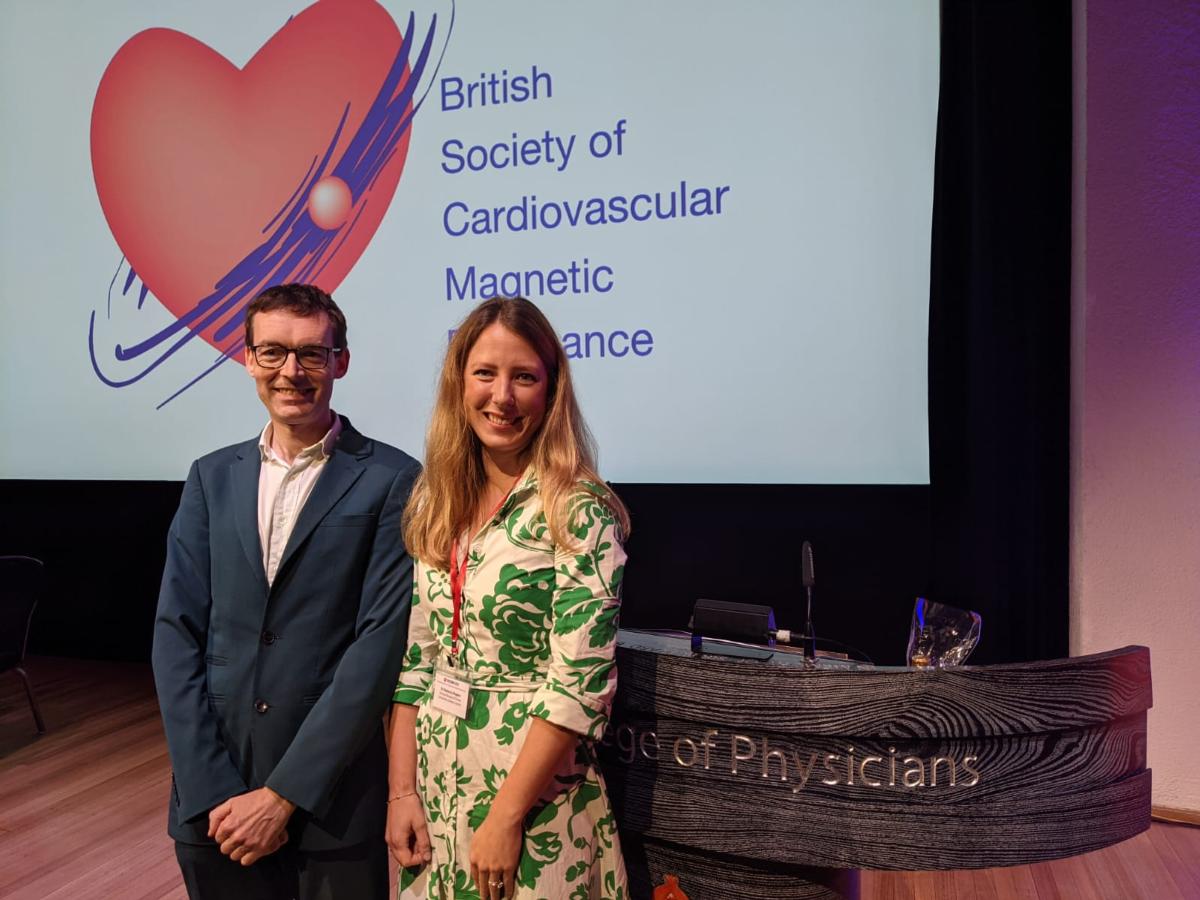Heart Centre researcher wins prestigious award

Congratulations to British Heart Foundation researcher Dr Rebecca Hughes, who won the British Society of Cardiovascular Magnetic Resonance (BSCMR) Annual Young Investigator Award last week.
The award was presented to Dr Hughes for discovering that 100 percent of patients studied with apical hypertrophic cardiomyopathy have impaired blood flow within the small arteries that run through the heart muscle at the tip of the heart (the apex).
In Dr Hughes’ research the use of the novel ‘perfusion mapping’ technique, developed by Barts Health and the National Institutes for Health, allows defects in blood flow through the heart muscle to be visualised and automatically quantified.
Hypertrophic cardiomyopathy is a common form of heart muscle disease caused by faults (mutations) in the DNA. It causes the heart muscle wall to thicken abnormally, and those with the disease are at risk of dying suddenly from dangerous heart rhythms.
When thickening mostly affects the tip of the heart, it is termed apical hypertrophic cardiomyopathy.
This accounts for 10 percent of hypertrophic cardiomyopathy cases but has many differences from more observed forms of the disease in terms of risk, identifiable gene mutations and ethnic variation.
BSCMR is the national representative body in the UK for CMR and promotes the clinical use and practice of highly-quality and cutting edge CMR.
They encourage young researchers working on all aspects of CMR research to submit their work for their Young Investigators’ Award.
A cardiovascular magnetic resonance (CMR) scan uses a strong magnetic field to create detailed images of a patient’s heart and provides information on the structure and function of the heart.
Clinical research fellow Dr Rebecca Hughes said: "In research, it is very rare for a new finding to be 100% prevalent.
"And when you do it strongly suggests that you are looking at a crucial underpinning disease mechanism.
“This new insight has the potential to change how we understand the development of the disease, how we diagnose it, and suggests avenues to explore for targeted treatment options in future.
“It is a privilege to be part of the CMR research team at Barts Heart Centre under the supervision of Professor James Moon, and I am delighted to have won such a prestigious award."
Read more

 Afrikaans
Afrikaans Albanian
Albanian Amharic
Amharic Arabic
Arabic Armenian
Armenian Azerbaijani
Azerbaijani Basque
Basque Belarusian
Belarusian Bengali
Bengali Bosnian
Bosnian Bulgarian
Bulgarian Catalan
Catalan Cebuano
Cebuano Chichewa
Chichewa Chinese (Simplified)
Chinese (Simplified) Chinese (Traditional)
Chinese (Traditional) Corsican
Corsican Croatian
Croatian Czech
Czech Danish
Danish Dutch
Dutch English
English Esperanto
Esperanto Estonian
Estonian Filipino
Filipino Finnish
Finnish French
French Frisian
Frisian Galician
Galician Georgian
Georgian German
German Greek
Greek Gujarati
Gujarati Haitian Creole
Haitian Creole Hausa
Hausa Hawaiian
Hawaiian Hebrew
Hebrew Hindi
Hindi Hmong
Hmong Hungarian
Hungarian Icelandic
Icelandic Igbo
Igbo Indonesian
Indonesian Irish
Irish Italian
Italian Japanese
Japanese Javanese
Javanese Kannada
Kannada Kazakh
Kazakh Khmer
Khmer Korean
Korean Kurdish (Kurmanji)
Kurdish (Kurmanji) Kyrgyz
Kyrgyz Lao
Lao Latin
Latin Latvian
Latvian Lithuanian
Lithuanian Luxembourgish
Luxembourgish Macedonian
Macedonian Malagasy
Malagasy Malay
Malay Malayalam
Malayalam Maltese
Maltese Maori
Maori Marathi
Marathi Mongolian
Mongolian Myanmar (Burmese)
Myanmar (Burmese) Nepali
Nepali Norwegian
Norwegian Pashto
Pashto Persian
Persian Polish
Polish Portuguese
Portuguese Punjabi
Punjabi Romanian
Romanian Russian
Russian Samoan
Samoan Scottish Gaelic
Scottish Gaelic Serbian
Serbian Sesotho
Sesotho Shona
Shona Sindhi
Sindhi Sinhala
Sinhala Slovak
Slovak Slovenian
Slovenian Somali
Somali Spanish
Spanish Sundanese
Sundanese Swahili
Swahili Swedish
Swedish Tajik
Tajik Tamil
Tamil Telugu
Telugu Thai
Thai Turkish
Turkish Ukrainian
Ukrainian Urdu
Urdu Uzbek
Uzbek Vietnamese
Vietnamese Welsh
Welsh Xhosa
Xhosa Yiddish
Yiddish Yoruba
Yoruba Zulu
Zulu